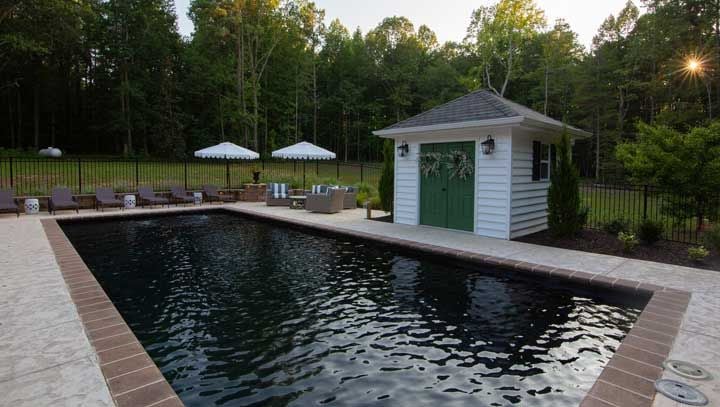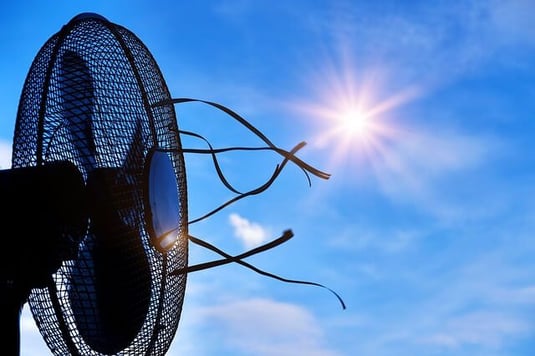
Have you ever jumped into a pool expecting it to be cool and refreshing only to discover that the water is hot?
That's exactly when you need a pool chiller.
Many people write-off pool chillers, thinking that their pool water won't get hot enough for one. While this can be the case in certain climates, it certainly is not the rule.
As fiberglass pool manufacturers, we are constantly asked how to cool down pool water. Although there are a few other things that you can do (like adding shade or running your filter at night), our best answer is always to invest in a good pool chiller.
So, in this article, we'll break down what a pool chiller is, how it works, how much it might cost, and more. By the end, you should have a better idea of whether a pool chiller is right for your inground pool.

What is a pool chiller?
A pool chiller is an electric machine that circulates and cools down the water in your swimming pool. Circulating pool water will naturally lower the overall temperature of your swimming pool (that's why running water features like a waterfall also has a cooling effect). But to avoid running your pool pump all day and burning it out, a pool chiller can step in and keep the water moving with additional airflow to make it much more refreshing.
How does a pool chiller work?
As the water circulates through your pool chiller machine, cooling fans are activated to lower the water temperature even further before it is returned to the pool. An average pool chiller should lower the water temperature by about 5 to 10 degrees by the time the water is done circulating through the chiller.
Note: Many inground pool owners opt for a pool heat pump with a chiller. Heat pump chiller combos can both inject the pool water with heat or remove the heat from the pool water, depending on the weather.
Can you get a pool chiller without a pool heater?
We've mentioned before that it's a good idea to add a pool chiller to your heat pump if you want to get a pool heater, but not all pool chillers come as heater/chiller combos. You'll still have several options across manufacturers when it comes to standalone pool chillers if you don't want a combination unit.
How much is a pool chiller?
Overall, you can probably get a new pool chiller and heater combo for around $6,100 to $6,500. Standalone pool chillers typically have starting costs of $2,500 to $3,500 and up.
Keep in mind that pool chiller prices will vary depending on the size of your pool, the manufacturer, and the pool chiller type. The larger your pool is, the bigger your pool chiller will need to be and the more it may cost.
Are pool chillers worth it?
Let's answer a question with a question: Is the AC unit in your car worth it? After all, no one gets in the pool to heat up on a hot summer day. If you want a refreshing, relaxing experience when you dive into your pool, you may find that a pool chiller is a worthy investment. If you don't care about the water temperature and you mostly want your pool for occasional gatherings or exercise, you may not need to shell out the cash for a chiller just yet.
If you're having trouble deciding, you can test the temperature of your pool water on a hot day and see how it compares to optimal pool water temperatures. We tested the effectiveness of pool chillers in our pool park and saw a 9-degree difference. The pool water without the pool chiller was 92 degrees while the pool water with the pool chiller was 83 degrees.
What is a comfortable water temperature for swimming?
Most experts agree that a suitable water temperature for recreational swimming pools is between 78 and 86 degrees. If your pool water goes way above that during the summer months, you might want to consider trying out a pool chiller to bring it down a notch.
What are some of the benefits of having a pool chiller?
Aside from cooling down your pool water and making it comfortable for swimming, a pool chiller can help you combat algae and save you money on pool chemicals.
With increased water circulation and cooler temperatures, algae are less likely to take hold on the surface of your inground pool. That is a huge plus if you have a gunite pool with a plaster surface (algae love those!). Keeping your water cooler can also help you save on chemicals because they won't wear out as quickly as they do in the heat (that's why you need to sanitize your hot tubs and spas constantly).
How long will a pool chiller last?
If you're hesitant to spend a lot of money on a short-lived product, you're not alone. Many concerned pool shoppers want to know how long an accessory will last before they buy it. The average pool chiller lifespan lasts between 10 and 20 years, depending on the brand, how well you maintain it, and how often you use it.
Is it expensive to run a pool chiller?
Don't make the mistake of thinking a pool chiller is as expensive as a pool heater. Pool chillers are much more energy-efficient and can cost less than a dollar per day to ten dollars or more to run depending on the type and how long you use it. Pool chillers that are hooked up to solar energy may cost even less.
Do dark bottom pools need a chiller?
The short answer: Probably
The long answer: If you've ever gotten into a black car on a hot summer day, you'll know how the dark paint can absorb the heat and turn the car into an easy bake oven. Your swimming pool color can have a similar effect on water temperature. That can be great if you want to take advantage of the sun to warm your pool, but what if you live someplace that gets super hot?
Our best recommendation is to plan on getting a pool chiller because you're probably going to need it. A pool chiller can keep the water in dark bottom pools crisp and pleasant on scorching summer days.
Note: This applies to pools that are painted colors other than white, tan, or light blue.
When can you install a pool chiller?
Just like a pool heater, you can install a pool chiller at any time. It doesn't matter if you're just getting your pool or if you've had your pool for ten years. Pool chillers are usually easy to set up and operate whenever you're ready to get one.
Note: If you plan to get a pool heat pump with a pool chiller, you must add the pool chiller when you get the heater. A pool chiller cannot be added to your heat pump later.
Which swimming pools need a pool chiller?
Most cities experience high temperatures at least a few days per year, and those are normally the days when we're most inclined to jump in the pool. For that reason, pretty much anyone can benefit from installing a pool chiller. But, some things might make a pool chiller more of a necessity than an option, including:
- You live in a very warm climate
- You have a dark bottom pool
- Your pool is less than 6.5 feet deep
- Your pool is finished with pebble or tile
Pool chillers go a long way in very warm climates that reach the 90s and beyond throughout the summer months. If you test your water and find that it rises above 86 degrees, a pool chiller can help to bring it back down to a comfortable level. If your pool is less than 6.5 feet deep, especially if it has a colored finish, it's more likely to heat up to an unpleasant temperature (whereas pools that are 8 feet or deeper might not get as warm). Finally, pebble and tile finishes on gunite or concrete pools are often prone to warming the pool water, making a chiller a good option for gunite pool owners.
Have questions or comments? Please leave them for us below, and we will answer them as soon as possible.
At River Pools, we manufacture high-quality fiberglass pools for customers throughout North America. If you want to explore your fiberglass inground pool options, you can browse our catalog, visit our video library, try our pool pricing calculator, or request custom pricing using the button below.
Not sure which pool type is right for your home? You can download our free ebook for a full in-depth comparison of the three main inground pool types.
Up Next:
Swimming Pool Heaters: Types, Costs, Pros & Cons
Jason Hughes is a partner at River Pools Virginia, a fiberglass pool installation company based in Warsaw, Virginia. With over 20 years of hands-on experience, Jason has dedicated his career to helping families create beautiful, functional backyards while ensuring every fiberglass pool installation meets the highest standards of quality and safety. In addition to his work with homeowners, Jason serves as a GENESIS instructor with the Pool & Hot Tub Alliance (PHTA), where he teaches fiberglass pool installation best practices to pool professionals across the country. Whether he’s on a job site or leading a training session, Jason is passionate about raising the bar for fiberglass pool installations and helping families make confident, informed decisions as they transform their outdoor spaces.
Topics:


